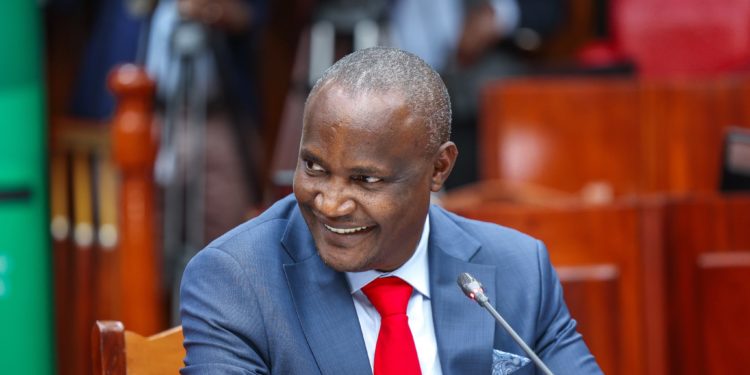John Mbadi, the nominee for Cabinet Secretary of the Treasury, articulated his strategic vision to address Kenya’s pressing fiscal challenges during his vetting by the National Assembly’s appointments committee. Mbadi emphasized transparency in debt management and reforms in tax collection as pivotal measures to stabilize the country’s economy.
In a session characterized by probing questions and detailed responses, Mbadi outlined his comprehensive approach to Kenya’s economic recovery. “Public debt levels in this country are worrying,” he stated, noting that the current debt stands at approximately 67-68% of GDP, translating to around KES 10.5 trillion. He stressed that debt accountability would be a top priority under his leadership. “Kenyans want proof and evidence of our actual level of debts. Debt accountability is number one priority for me,” he asserted.
Mbadi highlighted the need for greater transparency in government borrowing, proposing that a debt register be published annually. “It is not the government that owes money to Chinese, it is the people of Kenya. You cannot owe someone money without knowing how much you owe,” he declared, emphasizing the importance of making debt information publicly accessible.
Addressing the structure of public borrowing, Mbadi criticized the shift from project-specific loans to general budgetary support since 2014. He proposed a return to borrowing for specific, value-adding projects to ensure that borrowed funds contribute directly to economic growth. “We cannot borrow loans for general budgetary support. Debt should fund value-adding projects or proper investment in public assets,” he explained.
On the issue of tax collection, Mbadi pointed out systemic inefficiencies within the Kenya Revenue Authority (KRA). He called for a comprehensive overhaul of the tax system, focusing on capacity building and technological improvements. “KRA is like a cow which we milk without feeding. We need to reengineer the system to manage tax leakages effectively,” he stated.
Mbadi criticized the current recruitment and training practices at KRA, advocating for the reinstatement of rigorous graduate training programs. “You cannot have people who are not properly trained to collect taxes from people who hire properly trained accountants,” he remarked. He also underscored the importance of leadership and management reforms within the KRA to enhance its efficiency and effectiveness.
Expanding the tax base without overburdening existing taxpayers is another key aspect of Mbadi’s strategy. He highlighted the potential to increase tax revenue by raising the tax-to-GDP ratio from the current 14% to 18%, which could generate an additional KES 600 billion. “If we could just increase from 14% to 18% of GDP, you’ll be adding about KES 600 billion to our revenue base,” he noted, emphasizing the importance of reducing the fiscal deficit and closing fiscal gaps.
The nominee also addressed concerns about the rejection of the finance bill and its implications for Kenya’s fiscal stability. He reassured the committee and the public that there is no cause for alarm, citing historical precedents where finance bills were passed later in the financial year. “Let us stop making Kenyans panic. We have a legal framework which is still obtaining,” he reassured, mentioning that specific provisions of the bill could be reintroduced through amendments to existing statutes.
Mbadi’s extensive background in finance and governance adds weight to his proposals. With over 28 years of experience, including roles at the University of Nairobi and as the Regional Finance Director for a humanitarian organization, Mbadi has a deep understanding of financial management and public administration. His tenure as a member of the budget and appropriations committee and as chairman of the public accounts committee has given him significant insight into Kenya’s budgetary processes and expenditure oversight.
Despite his impressive credentials, Mbadi’s nomination comes at a time of significant economic challenges for Kenya. The country faces a high public debt burden, inefficiencies in tax collection, and fiscal deficits that threaten its economic stability. His plans to address these issues will require not only strategic vision but also effective implementation and cooperation from various stakeholders.
In his closing remarks, Mbadi expressed confidence in his ability to bring about meaningful change in Kenya’s financial management. “If given this opportunity, I can easily bring a difference in our financial management because that is a big concern in this country at the moment,” he concluded, highlighting his commitment to transparency, accountability, and fiscal prudence.


















